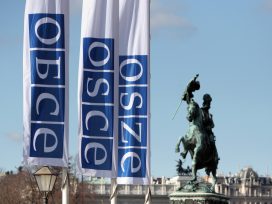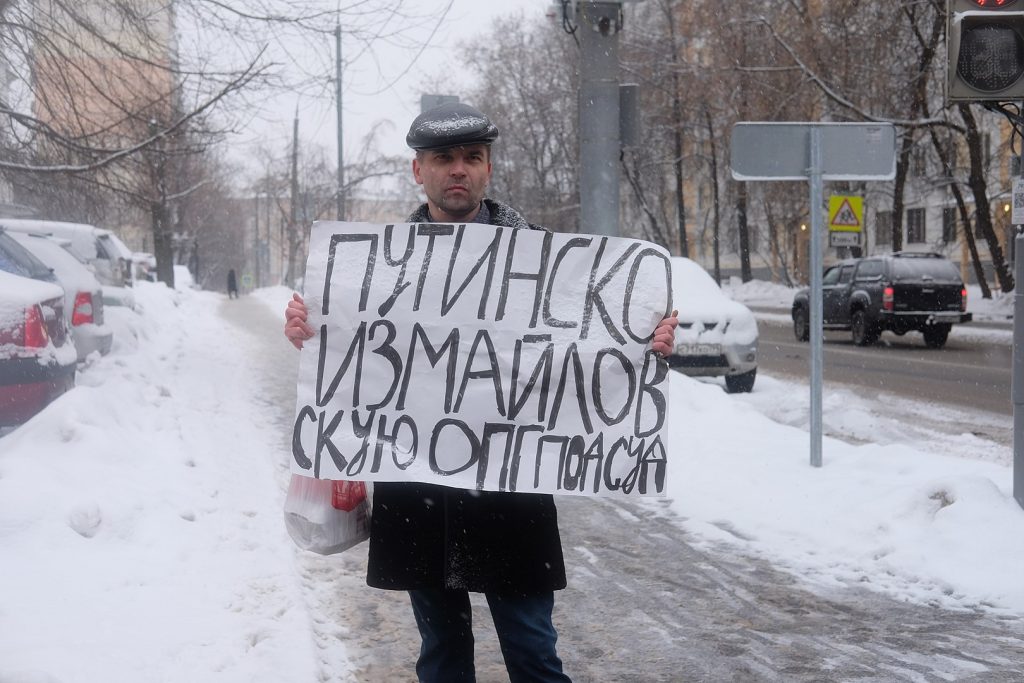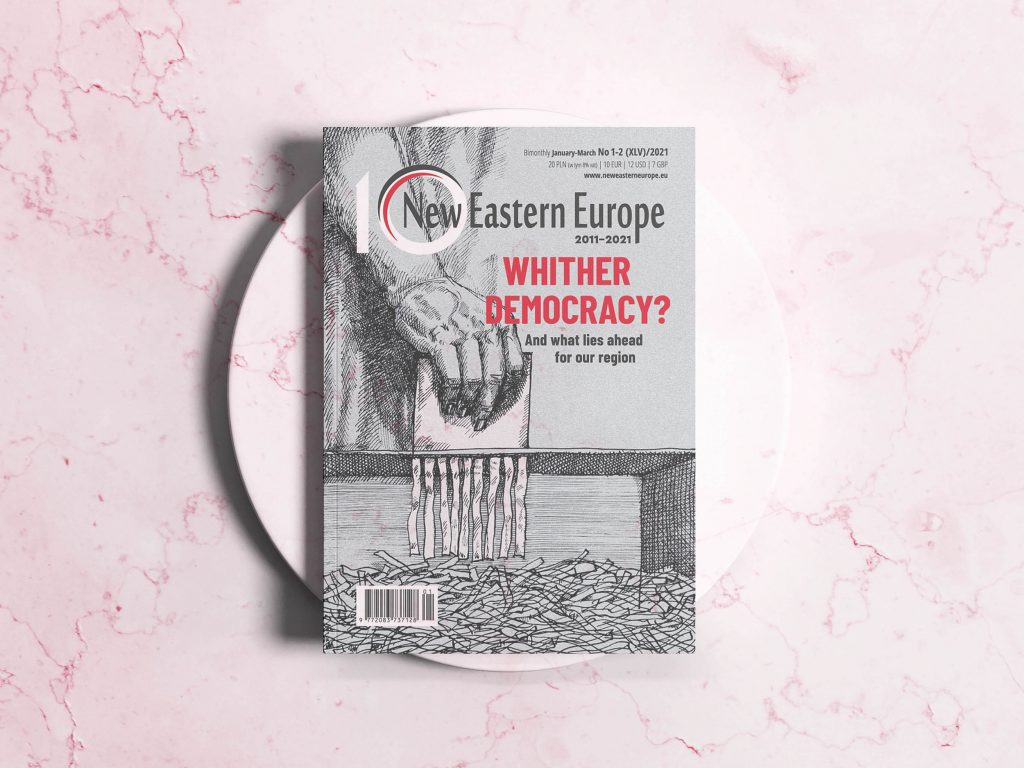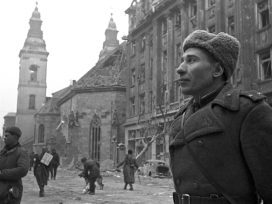Parliamentary elections in Russia are about much more than just window-dressing. They serve to legitimise the authoritarian regime in the eyes of the public as well as verify the efficacy of the state administration machinery. The tangible unease among the Kremlin’s decision-makers, provoked by an unfavourable economic future and a worrisome evolution in the social mood, has accelerated efforts to consolidate authoritarian rule. New repressive laws, passed in 2020, are intended to suppress civic rights and freedoms and nip any forms of grassroots mobilisation in the bud.
Mirage of stability
Putin’s plan for 2020 seemed perfect. The rotting authoritarian regime, which has lost some public support since the 2018 presidential election, badly needed to revive a ‘rally around the flag’ spirit among Russian citizens. The Kremlin had planned to mark 2020 as a kind of coronation of Vladimir Putin’s twenty-year rule, and its strategy was based on two pillars. First, the constitutional reform and the government reshuffle, announced in January, served to create the impression of a complex renewal of the system, leading to its greater effectiveness and legitimacy in the eyes of the public. But in fact, the constitutional amendments essentially boiled down to the final consolidation of authoritarian power in Putin’s hands and enabled him to potentially hold the office of president until 2036.
Second, the 75th anniversary of the victory over Nazism, solemnly celebrated in a traditional imperial setting, was intended to demonstrate the unity of the Russian nation against external threats, as well as offset the effects of growing socio-economic problems. The hope was that both manoeuvres would guarantee stability on the domestic front over the coming years, which is deemed indispensable for planning a seamless transition of power (possibly between 2024 and 2030).
However, a series of unwelcome surprises almost nullified the propaganda effects of this strategy and ruined the mirage of Putin’s perfect stability. The COVID-19 pandemic, which laid bare the defective state management, is merely one of the cracks in the façade. From the Kremlin’s point of view, there are even more reasons for anxiety.
The unprecedented rebellion against Alyaksandr Lukashenka’s rule in Belarus revived the Kremlin’s fear of another ‘colour revolution’ in Russia’s backyard and revealed the potential fragility of Russian authoritarian regime. The victory of Joe Biden in the American presidential election will probably make Russia more vulnerable in the international arena.
Last but not least, the Kremlin was taken by surprise by the mass, months-long protests in Khabarovsk (in the Russian far east), with a strong anti-Kremlin tone, provoked by the scandalous arrest of the local governor in July 2020. All these challenges feed the Kremlin’s obsessive fears of a West-orchestrated coup d’etat and exacerbate the ‘besieged fortress’ syndrome in Russian domestic policy. Against this backdrop, the Russian political system will undergo a stress-test this year, namely the parliamentary election planned for 19 September.
Looming challenges
Although the tripartite division of powers in Russia, significantly mutilated under Putin’s rule, has eroded further under the amended constitution, parliamentary elections continue to play a more than merely decorative role. The parliament, an appendage to the executive, is used as one of the key tools for maintaining stability in the political system, and one of the lobbying platforms for interest groups inside the ruling elite. This is why the Kremlin strives to keep a firm grip on both the formation and work of this body.
Parliamentary elections (which determine the composition of the State Duma – the lower house of the Federal Assembly) have several major functions. The regular holding of elections is intended to legitimise the authorities in the eyes of the public by creating the appearance of citizen empowerment, and by offering a substitute for real dialogue between the government and citizens. Elections are also intended to mobilise the state administration machinery, verify its effectiveness (as well as reveal weak points in the system) and select the ‘staff reserve’ for top positions in the central and regional apparatus.
The 2021 election, in particular, will be a crucial test for the system ahead of the next presidential vote (planned for 2024), and to prepare the ground for a major reshuffle and generational change within the ruling elite. However, there are a number of reasons why this year’s election may prove problematic for Putin’s regime.
The looming challenges that may influence the course and results of the next parliamentary election pertain mainly to the social consequences of the current economic crisis. Since 2013 the Russian economy has been swinging between stagnation and recession. Average annual GDP growth in 2015–2019 did not exceed 0.6 per cent. Russia is lagging behind developed countries in socio-economic and technological terms; this gap has been widening for years.
The present crisis, provoked by the pandemic, has merely exacerbated the intrinsic long-term barriers to growth, including an over-dependence on raw materials and the kleptocratic nature of the regime. The real incomes of citizens have been falling since 2014; according to forecasts this trend will continue over the next four to five years. The very structure of the Russian economy will impede compensatory growth after the present recession.
In these circumstances the ruling elite cannot use economic development and rising living standards as the basis for their legitimisation, as was the case between 2000 and 2008. Moreover, after the revival of the imperial spirit among the public in 2014, the regime now displays a conspicuous ideological void and has failed to formulate any attractive vision for the future. The years 2018–2020 were marked by ‘deep trends’ revealed by independent sociologists: growing social dissatisfaction with the present model of state management; mounting awareness of civic rights; demand for systemic change; and increased readiness to engage in public protests.
Public trust in Putin has fallen to around 30 per cent. Although the approval of his policy is approximately twice as high, it lags well behind its previous ‘Crimean’ peak of over 80 per cent, and thus fails to meet ideal authoritarian standards. Both indicators are the consequence of a total lack of political alternatives and do not reflect citizens’ real preferences.
Authoritarian reflex
The number of small-scale, localised protests grew significantly in 2020. Their causes varied from purely social-economic through ecological to purely political (the latter remaining a minority, however). There is a growing number of protest hot spots across Russia, although the overwhelming majority of the public remains passive. Nevertheless, as the election to the State Duma will be most probably combined with annual elections in the regions, the many local problems festering in the latter may disrupt the Kremlin’s desired scenario for parliamentary voting. Additionally, the government is gradually losing its dominance in the information sphere, as a growing proportion of Russians access online information and social media, thus bypassing traditional channels of Kremlin-sponsored TV propaganda. All these tendencies have made the decision-makers doubt the efficacy of the existing tools of political control.
However, the unconditioned authoritarian reflex to these challenges, which is deeply rooted in the Kremlin’s political culture, is itself generating further problems and tensions. It includes at least three reactions: first, an obsessively over-centralised regional policy; second, the hollowing out of the institution of the popular vote; and third, the zealous pursuit of total control over citizens.
The state called the Russian Federation is, in fact, a highly centralised entity. Not only are the regional budgets fully dependent on political priorities and the whims of the federal government, but the governors are appointed without much regard to the needs and expectations of the local populace. Over recent years, a growing number of newly appointed governors are outsiders in their regions and draw their legitimacy primarily or uniquely from the federal centre of power. They are expected to realise the vested interests of federal business circles at the cost of the social-economic development of the regions, not to mention of regional political-business clans. As with the Khabarovsk protests, this often leads to Moscow being accused of a ‘colonial policy of exploitation’.
The pursuit to rein in any undesirable social activity (often labelled as ‘anti-state’ or ‘anti-constitutional’), including in the run up to elections, has led to an array of repressive laws that were adopted in May–July and December 2020. The May–July laws not only further restricted passive electoral rights, but significantly limited independent election monitoring through the introduction of a multiday vote and an unprecedented expansion of voting outside polling stations. Both mechanisms allow for the manipulation of desired results on a scale much larger than before. Faulty and fraudulent as elections normally have been in the past, they have sometimes allowed for surprises. In 2018 and 2019, for example, a number of Kremlin-backed candidates lost regional elections. Now, independent candidates will be more effectively prevented from running, while monitors will not stand much chance of collecting and publicising proof of fraud. Electoral technologies in Russia have evolved into a full-fledged neo-Soviet mockery.
A hint of how the parliamentary election in September may look like are the estimates made by independent analyst Sergei Shpilkin after the constitutional vote in July 2020, where the new voting provisions were tried and tested. Based on a statistical analysis of the anomalies, Shpilkin found that 22.4 million votes were suspicious – more than twice as many as in the March 2018 presidential election (i.e. almost a third of the total votes officially cast).
The December laws allow for further suppression of horizontal self-organisation and the freedom of assembly, as well as of freedom of speech and information. The authorities do not conceal that these pre-emptive legal initiatives are specially tailored to the Duma election. They are primarily targeted against non-governmental organisations, peaceful protesters, election monitors, independent candidates and journalists, and will have three main effects. First, the activities of independent NGOs and politically active individuals are likely to be paralysed as new provisions expand the existing restrictions referring to ‘foreign agent’ status. Second, any form of anti-government protest (either collective or individual) could be treated as illegal. Third, in addition to existing gate-keeping laws, independent candidates could be ousted from electoral competition on charges of ‘representing foreign interests’.
The goal of this legal campaign is to prevent all forms of anti-Kremlin mobilisation in the run-up to the vote (especially the ‘smart vote’ initiative developed by Alexei Navalny’s network), as well as to intimidate frustrated citizens and deter them from protesting. The strategic goal of state repression is, in turn, to obliterate civil society, which has emerged in recent decades in opposition to the social atomisation inherited from the Soviet Union. The new laws are also likely to be intended to pre-emptively set the stage for future relations with the new American administration headed by Joe Biden, renowned for his strong attachment to democratic values.
In fact, Putin’s inner circle is now openly breaking with the Kremlin’s previous policy of maintaining the appearance of legality and instead is shutting down all the remaining safety valves. In this neo-Soviet sham, the public has been offered the role as ‘extras’ without a will and a voice, while the ruling elite anxiously seeks guarantees of future positions in the system under possible transition.
Self-fulfilling prophecy?
The 2021 vote is designed to end in a landslide victory for the ‘party of power’ – United Russia. The Kremlin clearly wants the party to officially gain at least a two-thirds constitutional majority, although the actual ambition may be to retain the current majority of three-fourths. This would be unattainable without mass fraud, since the electoral rating of United Russia has long been stuck at around 30 per cent. The authorities hope that an overwhelming electoral victory would not only demobilise the Russian public by demonstrating a total lack of alternatives, but also demonstrate both to the Russian political-economic elite and to the world that Vladimir Putin remains strong enough to fully control domestic political processes during a time of serious economic turmoil.
The authorities have thus created all the tools needed to rig the election, officially announce fake results and suppress possible social protests. Apart from repressions, they will engage the entire administrative apparatus in mobilising the loyal electorate, while discouraging regime opponents from voting (according to surveys by the Levada Centre, three-fourths of those who do not vote are against the regime). Employees of the state sector will be forced to vote for Kremlin-backed candidates; other necessary votes will be bought through the additional distribution of social assistance, badly needed during the present economic crisis.
Furthermore, the image of United Russia can be partially rebranded by co-opting fresh blood, including pro-Kremlin social activists, to run in the election, thus creating an artificial impression of change. While these methods are nothing new in Russia, it remains an open question whether they will be effective against the background of mounting public disillusionment in the work of state institutions during the pandemic. This is adding to the usual frustration with the conspicuous arrogance and large-scale corruption of the ‘servants of the people’.
The Kremlin’s reaction to real or potential threats and the resulting authoritarian overstretch are proof of the mounting unease among decision-makers. The presidential administration very probably fears an outburst of popular anger after the peak of the pandemic is past. But this tightening of the screws can easily backfire, leading to a wider electoral mobilisation of regime opponents or an eruption of mass protests in the wake of the parliamentary election. Mass unsanctioned rallies across the country after the arrest of Alexei Navalny offered vivid proof of a gradual change in the public mood. People with different political views were united in standing up against injustice, lawlessness and corruption. The scale of the response to Navalny’s treatment may indicate that the social base of opponents of the regime is broadening.
Even if public passivity and attachment to stability, which has been a trademark of the entire Putin regime, prevails over growing social discontent, gradual changes in the collective mentality will continue to pose a risk for the regime. Mounting awareness of the state’s dysfunctionality, together with the government’s repressive strategy, will further weaken the regime’s legitimacy. The widening gap between citizens and the state will probably generate political micro-crises and a critical mass may possibly develop able to disrupt Kremlin-designed political scenarios in the coming years.








